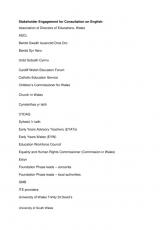Information on the Curriculum and Assessment (Wales) Bill.
Documents

Doc 1 , file type: XLSX, file size: 139 KB

Doc 2 , file type: PDF, file size: 59 KB

Doc 3 , file type: PDF, file size: 100 KB
Details
11 March
Dear
ATISN 16072 - Mandatory status of English in the Curriculum
Information requested
Thank you for your request which I received on 14 February 2022. You asked for information regarding the work undertaken as part of the Curriculum and Assessment (Wales) Bill which looked at English as a mandatory element for 3-7 year olds. Specifically you asked for copies of:
- The responses to the Bill consultation.
- The response to any legal advice sought with regards to the legality of removing English learning provision from parents of 3-7 year olds.
- Copies of the minutes of those meetings where it was decided which groups/organisations to aim the Bill consultation at.
Our response
A copy of the information I am releasing is outlined below.
- With regards to point 1, all 196 responses to the survey on Mandatory status of English in the Curriculum and Assessment (Wales) Bill.
- With regards to point 3, I can confirm that we do not hold this information as there were no such meetings. An e-mail was circulated to Welsh Government policy leads requesting details of groups/organisations to contact directly to ensure awareness of the survey.
- A list of stakeholders contacted directly to ensure awareness of the survey.
I have decided that some of the information described is exempt from disclosure under the following exemptions provided by the Freedom of Information Act 2000 (FOIA)
Section 40(2) ‘Personal data’
Section 42(1) ‘Legal Professional Privilege’
The reasons for applying these exemptions are set out in full at Annex 1 to this letter.
Next steps
If you are dissatisfied with the Welsh Government’s handling of your request, you can ask for an internal review within 40 working days of the date of this response. Requests for an internal review should be addressed to the Welsh Government’s Freedom of Information Officer at:
Information Rights Unit,
Welsh Government,
Cathays Park,
Cardiff,
CF10 3NQ
or Email: Freedom.ofinformation@gov.wales
Please remember to quote the ATISN reference number above.
You also have the right to complain to the Information Commissioner. The Information Commissioner can be contacted at:
Information Commissioner’s Office,
Wycliffe House,
Water Lane,
Wilmslow,
Cheshire,
SK9 5AF.
However, please note that the Commissioner will not normally investigate a complaint until it has been through our own internal review process.
Yours sincerely
Annex 1
Application of exemptions/exceptions
The Freedom of information Act/Environmental Information Regulations provide a right for anyone to ask a public authority to make requested information available to the wider public. As the release of requested information is to the world, not just the requester, public authorities need to consider the effects of making the information freely available to everybody. Any personal interest the requester has for accessing the information cannot override those wider considerations.
I have decided to withhold the following information:
- “the names of individuals from the survey responses where they requested anonymity.
- “The response to any legal advice received on the provision of English to learners between 3-7 years old”
This Annex sets out the reasons for the engagement of section(s)
- Section 40(2) ‘Personal Information’ of the Freedom of Information 2000 Act
- Section 42(1) of the Freedom of Information Act ‘Legal Professional Privilege’
and our subsequent consideration of the Public Interest Test.
Freedom of Information Act 2000: Section 40(2) (Personal Information)
Section 40(2) together with the conditions in section 40(3)(a)(i) or 40(3)(b) provides an absolute exemption if disclosure of the personal data would breach any of the data protection principles.
‘Personal data’ is defined in sections 3(2) and (3) of the Data Protection Act 2018 (‘the DPA 2018’) and means any information relating to an identified or identifiable living individual. An identifiable living individual is one who can be identified, directly or indirectly, in particular by reference to an identifier such as a name, an identification number, location data, an online identifier or to one or more factors specific to the physical, physiological, genetic, mental, economic, cultural or social identity of the individual.
When completing the survey, respondents were provided with an option to respond anonymously. By requesting anonymity these individuals were not providing consent for their identities to be released. In such cases we have not included individuals’ names alongside their responses.
Under Section 40(2) of the FOIA, personal data is exempt from release if disclosure would breach one of the data protection principles set out in Article 5 of the GDPR. We consider the principle being most relevant in this instance as being the first. This states that personal data must be:
“processed lawfully, fairly and in a transparent manner in relation to the data subject”
The lawful basis that is most relevant in relation to a request for information under the FOIA is Article 6(1)(f). This states:
“processing is necessary for the purposes of the legitimate interests pursued by the controller or by a third party except where such interests are overridden by the interests or fundamental rights and freedoms of the data subject which require protection of personal data, in particular where the data subject is a child”.
In considering the application of Article 6(1)(f) in the context of a request for information under FOIA it is necessary to consider the following three-part test:-
- The Legitimate interest test: Whether a legitimate interest is being pursued in the request for information;
- The Necessity test: Whether disclosure of the information/confirmation or denial that it is held is necessary to meet the legitimate interest in question;
- The Balancing test: Whether the above interests override the interests, fundamental rights and freedoms of the data subject.
Consideration of these tests is set out below:
- Legitimate interests
Freedom of information requests are handled as ‘applicant blind’ and public authorities or not entitled to speculate on why a requester seeks information. To that end, and whilst the Welsh Government acknowledges the general interest in openness and transparency, we can identify no specific legitimate interest in publishing this information.
- Is disclosure necessary?
In terms of transparency, understanding the responses to the consultation on the Mandatory status of English in the Curriculum and Assessment (Wales) Bill can be satisfied by the release of the responses. The identification of the individuals involved in that process is not necessary to meet that interest and, as stated above, no specific legitimate interest to release the information has been identified.
- The balance between legitimate interests and the data subject’s interests or fundamental rights and freedoms
As it has been concluded it is not necessary to disclose the personal information caught by the request, there is no requirement to balance the rights and interests of those individuals against the rights, under FOIA, of the requester.
As release of the information would not be legitimate under Article 6(1)(f), and as no other condition of Article 6 is deemed to apply, release of the information would not be lawful within the meaning of the first data protection principle. It has therefore been withheld under section 40 of the Freedom of Information Act. Section 40 is an absolute exemption and not subject to the public interest test.
Freedom of Information Act 2000: Section 42(1) (Legal Professional Privilege)
This exemption states:
- Information in respect of which a claim to legal professional privilege or, in Scotland, to confidentiality of communications could be maintained in legal proceedings is exempt information.
Legal professional privilege (LPP) covers communications between lawyers and their clients for the purpose of obtaining legal advice, or documents created by or for lawyers for the “dominant” (main) purpose of litigation. The information in question was advice provided by the Welsh Government's legal services divisions and we believe that LPP attaches to this information.
The section 42 exemption is qualified, which means that it is subject to a public interest test. That there is a public interest served in public authorities being able to access advice which benefited from professional legal privilege was noted in Bellamy v the Information Commission and DTI [EA/2005/0023] in which the tribunal, on the subject of LPP said:
"there is a strong element of public interest inbuilt into the privilege itself. At least equally strong countervailing considerations would need to be adduced to override that inbuilt interest….it is important that public authorities be allowed to conduct a free exchange of views as to their legal rights and obligations with those advising them without fear of intrusion, save in the most clear case…”.
The Welsh Government is of the firm view that it is highly important to maintain legal professional privilege and that, in the absence of at least equally strong countervailing considerations, any attempt to undermine the principle of legal professional privilege would result in substantial harm.
Legal advisers need to be able to present the full picture to their clients, in this case all UK Government and devolved administrations, which includes arguments in support of final conclusions and any relevant counter-arguments. This is the purpose behind the long-established principle of legal professional privilege.
It is in the nature of legal advice that it often sets out the possible arguments both for and against a particular view. If recipients or providers of legal advice believe that it is likely that the legal advice would be published, especially so soon after being sought and in a complex political environment, then it is unlikely that comprehensive advice would be commissioned or provided. This would be likely to result in substantial harm to the quality of decision-making since it would not be fully informed. It would also undermine the ability of legal advisers and their clients to rely confidently on the protection afforded by the principle of legal professional privilege.
Moreover, disclosure of legal advice has a significant potential to prejudice the governments’ ability to defend its legal interests - both directly by unfairly exposing its legal position to challenge, and indirectly by diminishing the reliance it can place on the advice having been fully considered and presented without fear or favour.
To that end, we believe the information in question should be properly withheld under Section 42(1) of the Freedom of Information Act.
